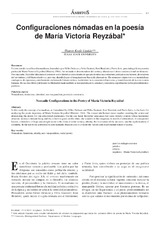Configuraciones nómadas en la poesía de María Victoria Reyzábal
Autor
Keefe Ugalde, Sharon
Editor
Asociación de Estudios de Ciencias Sociales y HumanidadesFecha
2013Materia
Reyzábal, María Victoria, 1944 -Poesía
España
Siglo XX
METS:
Mostrar el registro METSPREMIS:
Mostrar el registro PREMISMetadatos
Mostrar el registro completo del ítemResumen
En este estudio se utiliza el nomadismo, formulado por Gilles Deleuze y Felix Guattari, Rosi Braidotti y Pierre Joris, para indagar la trayectoria poética de María Victoria Reyzábal (Madrid, 1944). Ser nómada es desentenderse del centro y abandonar el deseo unidireccional del dominio. Por una parte, Reyzábal denuncia el contexto socio-histórico circundante en que predomina una estructura jerárquica excluyente, destructora del ser íntimo y del bien colectivo y, por otra, deambula por el imaginario en busca de alternativas. En remansos imprevistos se materializan «milagros» de esperanza y arrobamiento en forma del éxtasis erótico, la alteridad, la re-creación del universo, y la mitificación de la convivencia humana. En sus diez libros publicados la libertad nómada también se transparenta en la variedad y naturaleza experimental de los procedimientos poéticos. In this study the concept of nomadism, as formulated by Gilles Deleuze and Felix Guattari, Rosi Braidotti and Pierre Joris, is the basis for analyzing the poetic trajectory of María Victoria Reyzábal (Madrid, 1944). The nomad intellectual stance implies avoiding the center and abandoning the desire for one-directional dominance. On the one hand, Reyzábal denounces her socio-historic context whose hierarchal structure destroys intimate being and the collective good; on the other, she wanders in the imaginary in search of alternatives. In unexpected havens, «miracles» of hope and delight occur in the form of erotic ecstasy, alterity, the re-creation of the universe, and the mythification of solidarity. In the ten books published to date nomadic freedom also is evident the variety and experimental nature of poetic.

